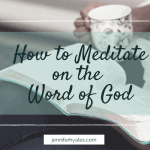How to Meditate on the Word of God
I used to envision Rafiki every time I heard the word meditation. It sounded like something I would do in yoga pants on a mat while sipping green tea.
But then I remembered that the Bible commands us to meditate on the Word, so Christian meditation must be something different (and it is).
In eastern religion, meditation is about emptying the mind. But what the Bible teaches us is filling the mind with the Word of God. And that’s something all of us should desire to do.
In his book, Spiritual Disciplines for the Christian Life, Donald S. Whitney defines meditation this way:
deep thinking on the truths and spiritual realities revealed in Scripture or upon life from a Scriptural perspective, for the purpose of understanding, application, and prayer
In other words, meditation goes beyond just hearing or reading the Word; it involves spending time thinking about the Word more deeply and what that Word means for our lives.
Whitney uses the illustration of a tea bag (the irony was not lost on me). The longer we allow a tea bag to steep, the more tea permeates the water. A good soaking results in a stronger tea.
Likewise, when we spend time lingering and soaking in the Word, the result is that we are immersed into God’s way of thinking so that it impacts the totality of who we are.
I love this promise to Joshua:
“Do not let this Book of the Law depart from your mouth; meditate on it day and night, so that you may be careful to do everything written in it. Then you will be prosperous and successful.”
Joshua 1:8-9, NIV
This verse was one of the first I memorized as a young believer. The Lord was sending Joshua to succeed Moses in leading the Israelites. God promised Him success if Joshua would meditate on the Word.
We know that true success in God’s eyes is eternal and spiritual, but isn’t that the most important thing anyway? Ultimately, we don’t need wealth and fame, we need more of God. That’s what meditating on His Word gives us.
The more we think on God’s Word and its truths, the more we will see life through His eyes, the more we will want to walk in His ways, and the more we will want to bring Him glory–that’s success!
“Blessed is the man who does not walk in the counsel of the wicked or stand in the way of sinners or sit in the seat of mockers. But his delight is in the law of the LORD, and on his law he meditates day and night. He is like a tree planted by streams of water, which yields its fruit in season and whose leaf does not wither. Whatever he does prospers.”
Psalm 1:1-3
So, how do we meditate on the Word day and night?
First, we must delight in the Word.
The phrase “day and night” is what Hebrew scholars term a merism–a figure of speech in which two contrasting parts are used to encompass the whole. In other words, the Word should be so much a part of who we are that it encompasses our whole lives.
If we truly love Jesus, the Word made flesh, we will love His Word. That doesn’t mean we always understand everything we read, or even that we won’t sometimes have questions.
But it does mean that we believe His Word is true and that He chooses to communicate to us through that Word. We believe that His Word has the answers we need for life and that we can trust it.
“Delight yourself in the LORD and he will give you the desires of your heart.”
Psalm 37:4
I love this verse because it tells me that I can choose what I delight in. If I choose to delight in God and His Word, He will begin to place His desires in my heart so that I love what He loves.
Second, we must linger in the Word.
The Hebrew word for meditate means “to utter a sound, moan, meditate; to mutter; from the base meaning of uttering a sound of any kind comes figure of meditation, the act of thoughtful deliberation with the implication of speaking to oneself”
The NIV Exhaustive Bible Concordance, 2047
I love this definition because it’s telling us to think on the Word and then speak it to ourselves. That’s so much more than just listening to the Word or even reading the Word. It involves the mind, the heart, and the mouth.
We think on the Word:
“Finally, brothers, whatever is true, whatever is noble, whatever is right, whatever is pure, whatever is lovely, whatever is admirable,–if anything is excellent or praiseworthy–think about such things.”
Philippians 4:8
When we get our minds aligned with God’s Word, our hearts will be changed by it.
“For the word of God is living and active. Sharper than any two-edged sword, it penetrates even to dividing soul and spirit, joints and marrow; it judges the thoughts and attitudes of the heart.”
Hebrews 4:12
When we allow the Word to judge our hearts–out motives and attitudes–we are speaking those truths to ourselves. David had to “encourage himself in the Lord” (1 Samuel 30:6). We will have to allow the Word of God to correct wrong thinking.
“We demolish arguments and every pretension that sets itself up against the knowledge of God and we take captive every thought to make it obedient to Christ.”
2 Corinthians 10:5
Third, we must obey the Word.
When I spend time with God each day, I write out portions of Scripture as I think on them. I find verses to memorize and commit to my heart and mind. I prayerfully ask God to speak to me what He wants me to learn from His Word and how He wants me to apply it to my life.
Sometimes, I do word studies and look up cross references to get a deeper understanding of the truths I am studying. I may spend a few minutes thinking about what I have read and the implications for my life.
But if I don’t put any of these truths into practice in my life, it’s all in vain.
“Do not merely listen to the word, and so deceive yourselves. Do what it says.”
James 1:22
The promises of spiritual prosperity are for those who put the Word into practice. It would have done Joshua no good to meditate on the Law if he were not also “careful to do everything written in it.”
So, it is with us. Meditation is not an academic exercise without a practical application. The one who is fruitful and prosperous in Psalm 1 is also careful not to walk with the counsel of the world. Obedience to the Word is central.
All of these things comprise meditation. It’s more than a cursory glance at Scripture or a quick read of the Bible-in-a-year passages. That doesn’t mean we shouldn’t read the Bible in a year (I am currently doing so). It just means we combine that with time spent lingering as well.
Meditation is a spiritual discipline that will help us grow in our walk with the Lord. How will you put this command into practice?
Want to start memorizing Scripture? Get my free download How to Memorize Scripture in 10 Easy Steps.



2 Comments
Comments are closed.